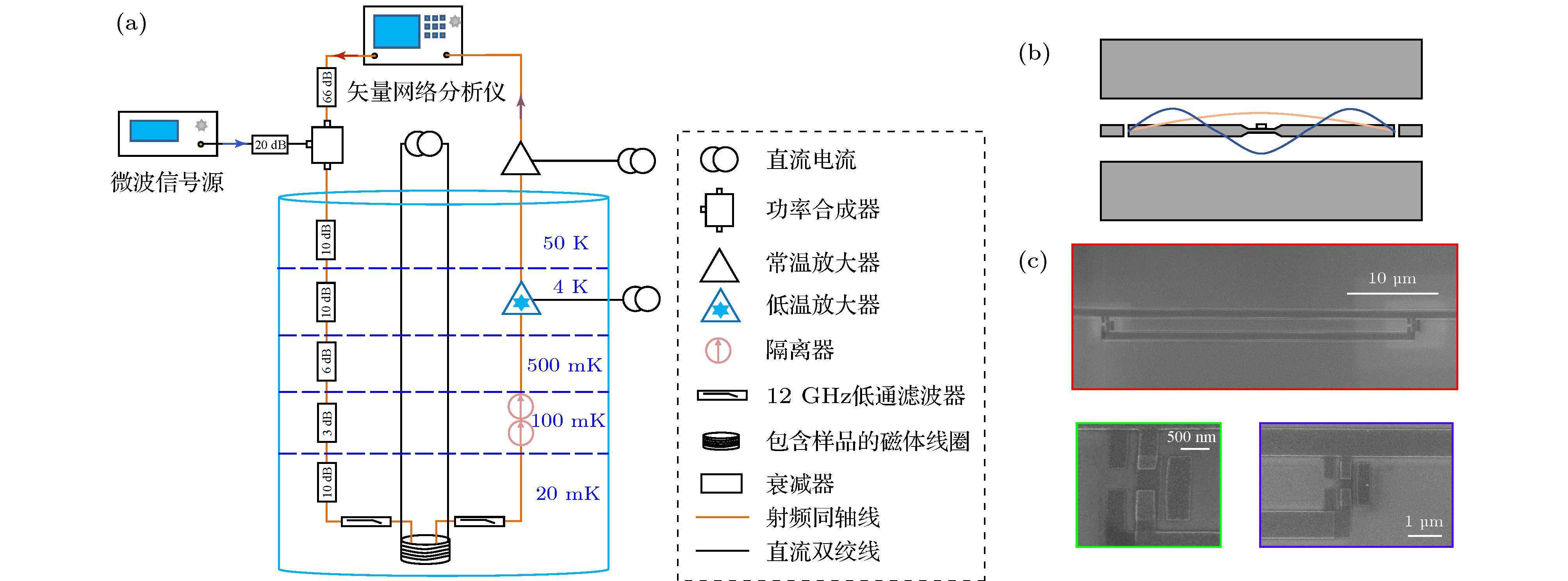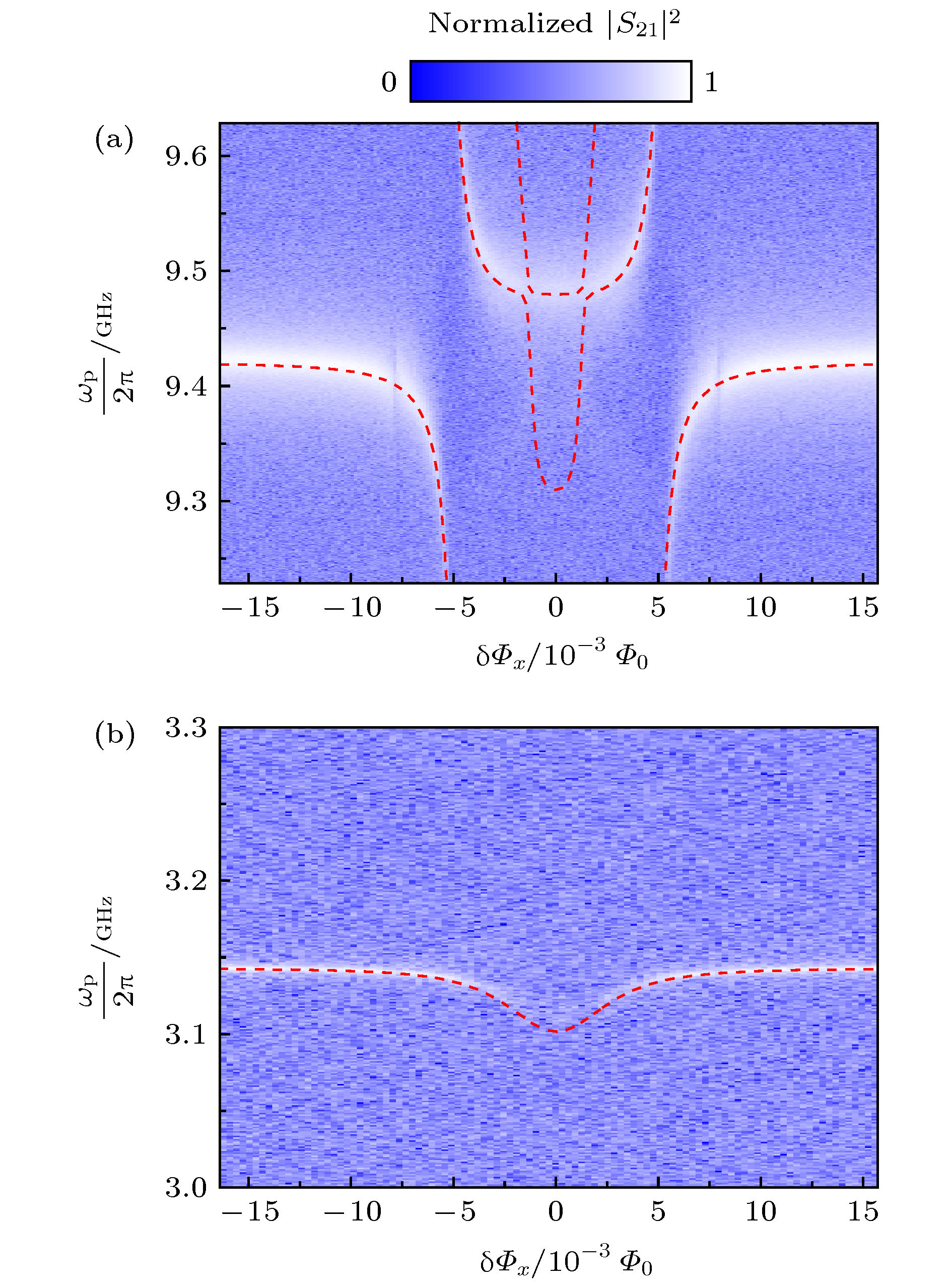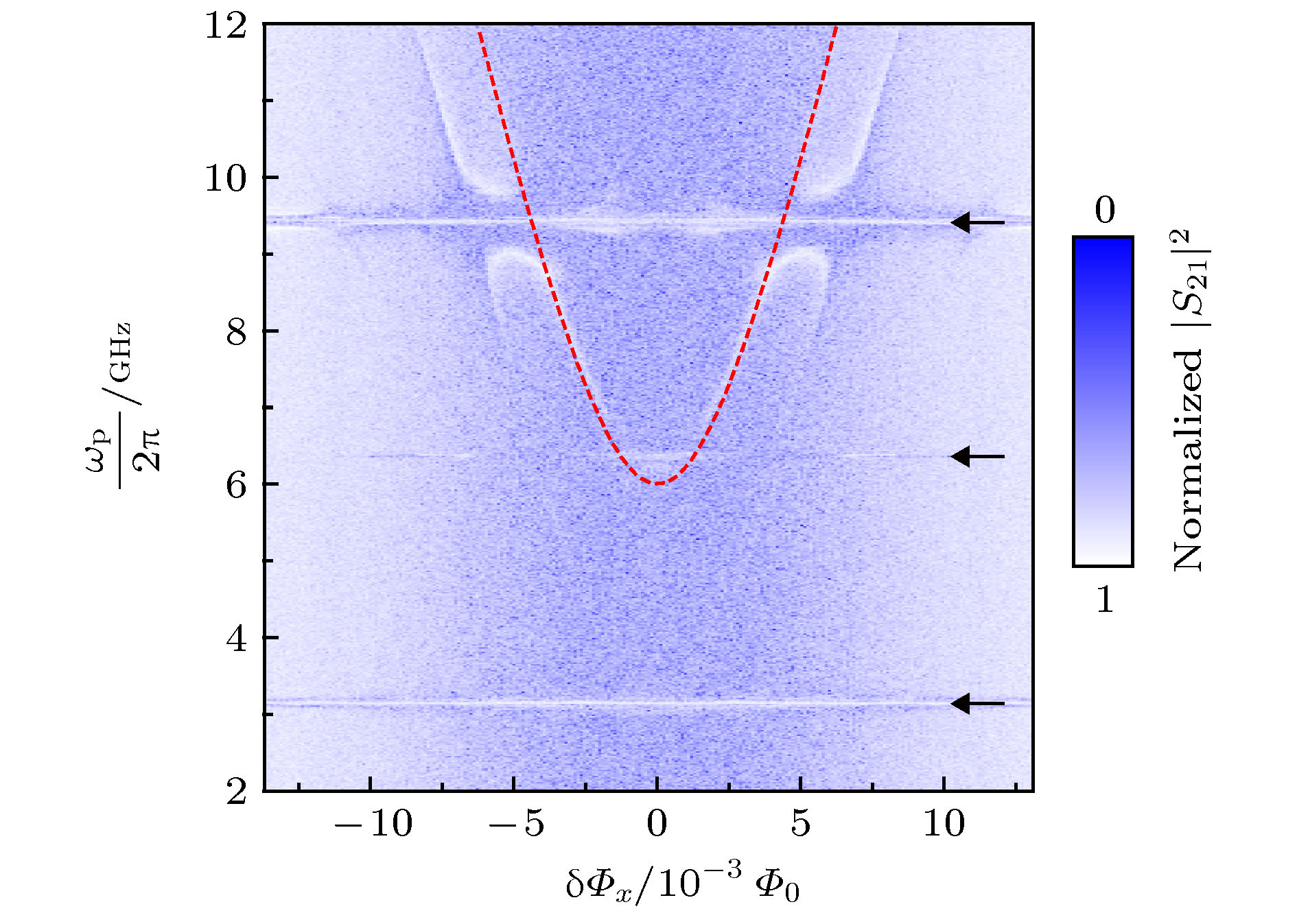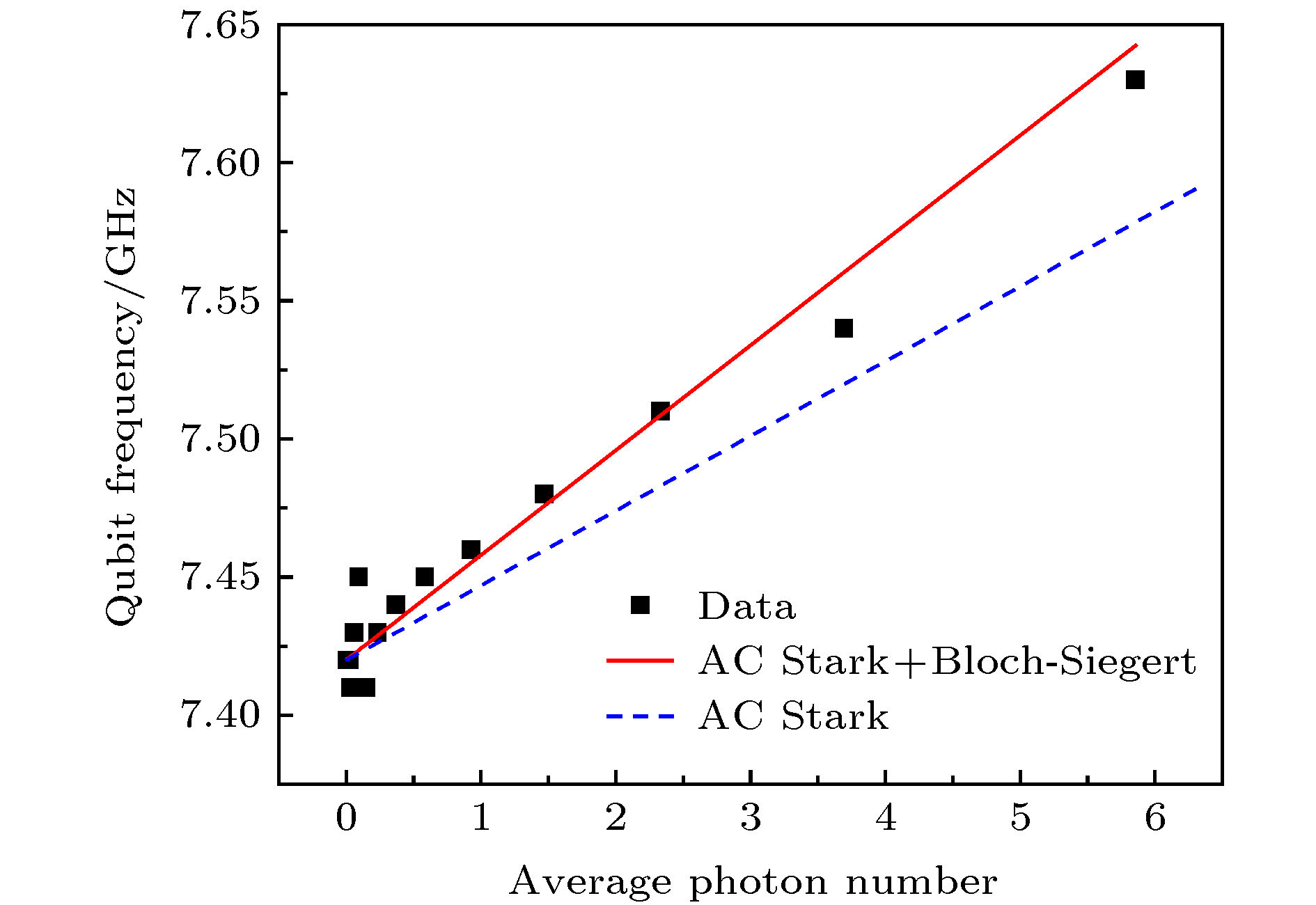-
从实验上研究了四结磁通量子比特与多模共面波导谐振腔构成的超强耦合电路量子电动力学系统. 通过传输谱测量和数值拟合, 确定量子比特与腔第一模式的耦合强度已达到0.1倍谐振腔频率, 进入了超强耦合区域; 通过色散读出方法得到了系统的能谱, 并通过增加探测场光子, 从能谱上得到了量子比特频率随探测光子的位移. 这种位移不仅包含旋波项的贡献, 也包含了反旋波项的显著贡献, 证实我们所实现的超强耦合系统是一个良好的研究量子拉比模型的实验平台, 它在量子技术的诸多方面有潜在的应用, 如量子模拟、超快量子逻辑门、纠缠态制备、量子比特保护等.In recent years, quantum Rabi model has aroused considerable interest because of its fundamental importance and potential applications in quantum technologies. For a conventional cavity-quantum-electrodynamic (cavity-QED) system involving the interaction between an atom and photons in a cavity, the atom-photon coupling frequency is much smaller than the transition frequency of the atom and the frequency of the cavity mode. This cavity-QED system is usually described by the Jaynes-Cummings model in which the rotating-wave approximation can be adopted by neglecting the counter-rotating coupling terms in the Hamiltonian of the system. However, by designing the unique structure of the superconducting circuit, the ultrastrong-coupling regime can be achieved in a circuit-QED system in which the counter-rotating coupling terms become as important as the rotating terms. Thus, the rotating-wave approximation cannot be used in the ultrastrongly coupled circuit-QED system. Owing to the ultrastrong coupling, this circuit-QED system is described by the standard quantum Rabi model when a superconducting qubit is coupled only to a single resonator mode. In this work, we experimentally study an ultrastrongly coupled circuit-QED system consisting of a four-junction superconducting flux qubit and a muti-mode coplanar-waveguide resonator. The transmission-spectrum measurement and numerical simulations show that the system is in the ultrastrong-coupling regime. By changing the photon number in the resonator, we observe the frequency shift of the flux qubit via the spectroscopic measurement. This frequency shift contains the contributions from not only the rotating-coupling terms but also the counter-rotating terms, which is in good agreement with the theory. The result indicates that this ultrastrongly-coupled quantum system can be used as a good platform to investigate the quantum Rabi model and has potential applications in various aspects of quantum technology, such as quantum simulation, ultrafast quantum gates, entangled-state preparation and protected qubits.
-
Keywords:
- superconducting flux qubit /
- ultrastrong coupling /
- quantum Rabi model /
- Bloch-Siegert shift
[1] Makhlin Y, Schon G, Shnirman A 2001 Rev. Mod. Phys. 73 357
 Google Scholar
Google Scholar
[2] You J Q, Nori F 2005 Phys. Today 58 42
 Google Scholar
Google Scholar
[3] Clarke J, Wilhelm F K 2008 Nature 453 1031
 Google Scholar
Google Scholar
[4] Krantz P, Kjaergaard M, Yan F, Orlando T P, Gustavsson S, Oliver W D 2019 Appl. Phys. Rev. 6 021318
 Google Scholar
Google Scholar
[5] You J Q, Nori F 2003 Phys. Rev. B 68 064509
 Google Scholar
Google Scholar
[6] Yang C P, Chu S I, Han S 2003 Phys. Rev. A 67 042311
 Google Scholar
Google Scholar
[7] Wallraff A, Schuster D I, Blais A, Frunzio L, Huang R S, Majer J, Kumar S, Girvin S M, Schoelkopf R J 2004 Nature 431 162
 Google Scholar
Google Scholar
[8] 赵士平, 刘玉玺, 郑东宁 2018 67 228501
 Google Scholar
Google Scholar
Zhao S P, Liu Y X, Zheng D N 2018 Acta Phys. Sin. 67 228501
 Google Scholar
Google Scholar
[9] Gu X, Kockum A F, Miranowicz A, Liu Y X, Nori F 2017 Phys. Rep. 718
[10] Nakamura Y, Pashkin Yu A, Tsai J S 1999 Nature 398 786
 Google Scholar
Google Scholar
[11] Mooij J E, Orlando T P, Levitov L, Tian L, van der Wal C H, Lloyd S 1999 Science 285 1036
 Google Scholar
Google Scholar
[12] Yu Y, Han S, Chu X, Chu S I, Wang Z 2002 Science 296 889
 Google Scholar
Google Scholar
[13] Martinis J M, Nam S, Aumentado J, Urbina C 2002 Phys. Rev. Lett. 89 117901
 Google Scholar
Google Scholar
[14] You J Q, Hu X, Ashhab S, Nori F 2007 Phys. Rev. B 75 140515
 Google Scholar
Google Scholar
[15] Yan F, Gustavsson S, Kamal A, Birenbaum J, Sears A P, Hover D, Gudmundsen T J, Rosenberg D, Samach G, Weber S, Yoder J L, Orlando T P, Clarke J, Kerman A J, Oliver W D 2016 Nat. Commun. 7 12964
 Google Scholar
Google Scholar
[16] Koch J, Yu T M, Gambetta J, Houck A A, Schuster D I, Majer J, Blais A, Devoret M H, Girvin S M, Schoelkopf R J 2007 Phys. Rev. A 76 042319
 Google Scholar
Google Scholar
[17] Barends R, Kelly J, Megrant A, Sank D, Jeffrey E, Chen Y, Yin Y, Chiaro B, Mutus J, Neill C, O’Malley P, Roushan P, Wenner J, White T C, Cleland A N, Martinis J M 2013 Phys. Rev. Lett. 111 080502
 Google Scholar
Google Scholar
[18] 金贻荣, 郑东宁 2017 科学通报 62 3935
 Google Scholar
Google Scholar
Jin Y R, Zheng D N 2017 Chin. Sci. Bull. 62 3935
 Google Scholar
Google Scholar
[19] Xu K, Chen J J, Zeng Y, Zhang Y R, Song C, Liu W, Guo Q, Zhang P, Xu D, Deng H, Huang K, Wang H, Zhu X, Zheng D, Fan H 2018 Phys. Rev. Lett. 120 050507
 Google Scholar
Google Scholar
[20] Yan Z, Zhang Y R, Gong M, Wu Y, Zheng Y, Li S, Wang C, Liang F, Lin J, Xu Y, Guo C, Sun L, Peng C Z, Xia K, Deng H, Rong H, You J Q, Nori F, Fan H, Zhu X, Pan J W 2019 Science 364 753
 Google Scholar
Google Scholar
[21] Song C, Xu K, Li H, Zhang Y R, Zhang X, Liu W, Guo Q, Wang Z, Ren W, Hao J, Feng H, Fan H, Zheng D, Wang D W, Wang H, Zhu S Y 2019 Science 365 574
 Google Scholar
Google Scholar
[22] Arute F, Arya K, Babbush R, et al. 2019 Nature 574 505
 Google Scholar
Google Scholar
[23] Niemczyk T, Deppe F, Huebl H, Menzel E P, Hocke F, Schwarz M J, Garcia-Ripoll J J, Zueco D, Hummer T, Solano E, Marx A, Gross R 2010 Nat. Phys. 6 772
 Google Scholar
Google Scholar
[24] Yoshihara F, Fuse T, Ashhab S, Kakuyanagi K, Saito S, Semba K 2017 Nat. Phys. 13 44
[25] Forn-Díaz P, García-Ripoll J J, Peropadre B, Orgiazzi J L, Yurtalan M A, Belyansky R, Wilson C M, Lupascu A 2017 Nat. Phys. 13 39
[26] Chen Z, Wang Y, Li T F, Tian L, Qiu Y Y, Inomata K, Yoshihara F, Han S, Nori F, Tsai J S, You J Q 2017 Phys. Rev. A 96 012325
 Google Scholar
Google Scholar
[27] Abdumalikov A A, Astafiev O, Nakamura Y, Pashkin Y A, Tsai J S 2008 Phys. Rev. B 78 180502
 Google Scholar
Google Scholar
[28] Zhu X B, Saito S, Kemp A, Kakuyanagi K, Karimoto S, Nakano H, Munro W J, Tokura Y, Everitt M S, Nemoto K, Kasu M, Mizuochi N, Semba K 2011 Nature 478 221
 Google Scholar
Google Scholar
[29] Zhu X B, Matsuzaki Y, Amsüss R, Kakuyanagi K, Shimo-Oka T, Mizuochi N, Nemoto K, Semba K, J. Munro W, Saito S 2014 Nat. Commun. 5 3524
 Google Scholar
Google Scholar
[30] Bertet P, Chiorescu I, Chiorescu G, Semba K, Harmans C J P M, DiVincenzo D P, Mooij J E 2005 Phys, Rev. Lett. 95 257002
 Google Scholar
Google Scholar
[31] Qiu Y, Xiong W, He X L, Li T F, You J Q 2016 Sci. Rep. 6 28622
 Google Scholar
Google Scholar
[32] Puebla R, Hwang M J, Casanova J, Plenio M B 2017 Phys. Rev. Lett. 118 073001
 Google Scholar
Google Scholar
[33] Wang Y M, Ballester D, Romero G, Scarani V, Solano E 2012 Phys. Scr. T 147 014031
 Google Scholar
Google Scholar
[34] Ashhab S, Nori F 2010 Phys. Rev. A 81 042311
 Google Scholar
Google Scholar
[35] Nataf P, Ciuti C 2011 Phys. Rev. Lett. 107 190402
 Google Scholar
Google Scholar
-
图 1 实验装置 (a)测量系统, 其中信号由网络分析仪和微波源发出, 经过衰减合成后进入稀释制冷机内部, 样品处在制冷机的最低温区, 测试时温度为20 mK; (b)共面波导谐振腔示意图, 磁通量子比特处于谐振腔中心, 黄色、蓝色曲线分别为第一、三模式电流分布; (c)磁通量子比特扫描电子显微镜图像
Fig. 1. Experimental setup: (a) Measurement system: signals from both the PNA and the PSG generator are combined and attenuated before entering the dilution refrigerator; the sample is placed in the sample chamber of the refrigerator whose working temperature is 20 mK; (b) the schematic of the coplanar-waveguide resonator, with a four-junction flux qubit located at the center of the resonator; yellow and blue curves are current distributions of the first and third modes of the resonator, respectively; (c) the scanning electron microscope images of the flux qubit.
图 2 系统传输谱随磁通量偏置的变化 (a)腔第三模式传输谱随磁通量偏置的变化; (b)腔第一模式传输谱随磁通量偏置的变化; 图中拟合红色虚线为哈密顿量(2)式数值解的结果
Fig. 2. The transmission |S21| as a function of the flux bias: (a) The transmission |S21| of the third mode of the resonator as a function of the flux bias; (b) the transmission |S21| of the first mode of the resonator as a function of the flux bias. Red dashed curves are the fitting results numerically obtained from the Hamiltonian (2) equation.
图 3 腔第一模式测量的系统能谱随外加磁通偏置的变化, 红色拟合虚线代表量子比特基态到激发态跃迁频率, 测量时腔内的平均光子数为
${\bar n_1} = {\rm{4}}{\rm{.7}} \times {\rm{1}}{{\rm{0}}^{ - 3}}$ Fig. 3. The spectrum measured using the first mode of the resonator as a function of the flux bias. The red dashed curve is the numerical result for the qubit transition and the average photon number in the resonator is
${\bar n_1} = $ 4.7 × 10–3.图 4 量子比特频率随光子数的变化, 红色实线表示包含交流斯塔克和布洛赫-西格特效应的拟合曲线, 蓝色虚线只包含交流斯塔克效应
Fig. 4. The qubit transition frequency as a function of the average photon number. The red solid curve denotes the simulation results when both the ac Stark and Bloch-Siegert shifts are included. The blue dashed curve denotes the simulation results when only the Bloch-Siegert shift is included.
-
[1] Makhlin Y, Schon G, Shnirman A 2001 Rev. Mod. Phys. 73 357
 Google Scholar
Google Scholar
[2] You J Q, Nori F 2005 Phys. Today 58 42
 Google Scholar
Google Scholar
[3] Clarke J, Wilhelm F K 2008 Nature 453 1031
 Google Scholar
Google Scholar
[4] Krantz P, Kjaergaard M, Yan F, Orlando T P, Gustavsson S, Oliver W D 2019 Appl. Phys. Rev. 6 021318
 Google Scholar
Google Scholar
[5] You J Q, Nori F 2003 Phys. Rev. B 68 064509
 Google Scholar
Google Scholar
[6] Yang C P, Chu S I, Han S 2003 Phys. Rev. A 67 042311
 Google Scholar
Google Scholar
[7] Wallraff A, Schuster D I, Blais A, Frunzio L, Huang R S, Majer J, Kumar S, Girvin S M, Schoelkopf R J 2004 Nature 431 162
 Google Scholar
Google Scholar
[8] 赵士平, 刘玉玺, 郑东宁 2018 67 228501
 Google Scholar
Google Scholar
Zhao S P, Liu Y X, Zheng D N 2018 Acta Phys. Sin. 67 228501
 Google Scholar
Google Scholar
[9] Gu X, Kockum A F, Miranowicz A, Liu Y X, Nori F 2017 Phys. Rep. 718
[10] Nakamura Y, Pashkin Yu A, Tsai J S 1999 Nature 398 786
 Google Scholar
Google Scholar
[11] Mooij J E, Orlando T P, Levitov L, Tian L, van der Wal C H, Lloyd S 1999 Science 285 1036
 Google Scholar
Google Scholar
[12] Yu Y, Han S, Chu X, Chu S I, Wang Z 2002 Science 296 889
 Google Scholar
Google Scholar
[13] Martinis J M, Nam S, Aumentado J, Urbina C 2002 Phys. Rev. Lett. 89 117901
 Google Scholar
Google Scholar
[14] You J Q, Hu X, Ashhab S, Nori F 2007 Phys. Rev. B 75 140515
 Google Scholar
Google Scholar
[15] Yan F, Gustavsson S, Kamal A, Birenbaum J, Sears A P, Hover D, Gudmundsen T J, Rosenberg D, Samach G, Weber S, Yoder J L, Orlando T P, Clarke J, Kerman A J, Oliver W D 2016 Nat. Commun. 7 12964
 Google Scholar
Google Scholar
[16] Koch J, Yu T M, Gambetta J, Houck A A, Schuster D I, Majer J, Blais A, Devoret M H, Girvin S M, Schoelkopf R J 2007 Phys. Rev. A 76 042319
 Google Scholar
Google Scholar
[17] Barends R, Kelly J, Megrant A, Sank D, Jeffrey E, Chen Y, Yin Y, Chiaro B, Mutus J, Neill C, O’Malley P, Roushan P, Wenner J, White T C, Cleland A N, Martinis J M 2013 Phys. Rev. Lett. 111 080502
 Google Scholar
Google Scholar
[18] 金贻荣, 郑东宁 2017 科学通报 62 3935
 Google Scholar
Google Scholar
Jin Y R, Zheng D N 2017 Chin. Sci. Bull. 62 3935
 Google Scholar
Google Scholar
[19] Xu K, Chen J J, Zeng Y, Zhang Y R, Song C, Liu W, Guo Q, Zhang P, Xu D, Deng H, Huang K, Wang H, Zhu X, Zheng D, Fan H 2018 Phys. Rev. Lett. 120 050507
 Google Scholar
Google Scholar
[20] Yan Z, Zhang Y R, Gong M, Wu Y, Zheng Y, Li S, Wang C, Liang F, Lin J, Xu Y, Guo C, Sun L, Peng C Z, Xia K, Deng H, Rong H, You J Q, Nori F, Fan H, Zhu X, Pan J W 2019 Science 364 753
 Google Scholar
Google Scholar
[21] Song C, Xu K, Li H, Zhang Y R, Zhang X, Liu W, Guo Q, Wang Z, Ren W, Hao J, Feng H, Fan H, Zheng D, Wang D W, Wang H, Zhu S Y 2019 Science 365 574
 Google Scholar
Google Scholar
[22] Arute F, Arya K, Babbush R, et al. 2019 Nature 574 505
 Google Scholar
Google Scholar
[23] Niemczyk T, Deppe F, Huebl H, Menzel E P, Hocke F, Schwarz M J, Garcia-Ripoll J J, Zueco D, Hummer T, Solano E, Marx A, Gross R 2010 Nat. Phys. 6 772
 Google Scholar
Google Scholar
[24] Yoshihara F, Fuse T, Ashhab S, Kakuyanagi K, Saito S, Semba K 2017 Nat. Phys. 13 44
[25] Forn-Díaz P, García-Ripoll J J, Peropadre B, Orgiazzi J L, Yurtalan M A, Belyansky R, Wilson C M, Lupascu A 2017 Nat. Phys. 13 39
[26] Chen Z, Wang Y, Li T F, Tian L, Qiu Y Y, Inomata K, Yoshihara F, Han S, Nori F, Tsai J S, You J Q 2017 Phys. Rev. A 96 012325
 Google Scholar
Google Scholar
[27] Abdumalikov A A, Astafiev O, Nakamura Y, Pashkin Y A, Tsai J S 2008 Phys. Rev. B 78 180502
 Google Scholar
Google Scholar
[28] Zhu X B, Saito S, Kemp A, Kakuyanagi K, Karimoto S, Nakano H, Munro W J, Tokura Y, Everitt M S, Nemoto K, Kasu M, Mizuochi N, Semba K 2011 Nature 478 221
 Google Scholar
Google Scholar
[29] Zhu X B, Matsuzaki Y, Amsüss R, Kakuyanagi K, Shimo-Oka T, Mizuochi N, Nemoto K, Semba K, J. Munro W, Saito S 2014 Nat. Commun. 5 3524
 Google Scholar
Google Scholar
[30] Bertet P, Chiorescu I, Chiorescu G, Semba K, Harmans C J P M, DiVincenzo D P, Mooij J E 2005 Phys, Rev. Lett. 95 257002
 Google Scholar
Google Scholar
[31] Qiu Y, Xiong W, He X L, Li T F, You J Q 2016 Sci. Rep. 6 28622
 Google Scholar
Google Scholar
[32] Puebla R, Hwang M J, Casanova J, Plenio M B 2017 Phys. Rev. Lett. 118 073001
 Google Scholar
Google Scholar
[33] Wang Y M, Ballester D, Romero G, Scarani V, Solano E 2012 Phys. Scr. T 147 014031
 Google Scholar
Google Scholar
[34] Ashhab S, Nori F 2010 Phys. Rev. A 81 042311
 Google Scholar
Google Scholar
[35] Nataf P, Ciuti C 2011 Phys. Rev. Lett. 107 190402
 Google Scholar
Google Scholar
计量
- 文章访问数: 8305
- PDF下载量: 105
- 被引次数: 0














 下载:
下载:





